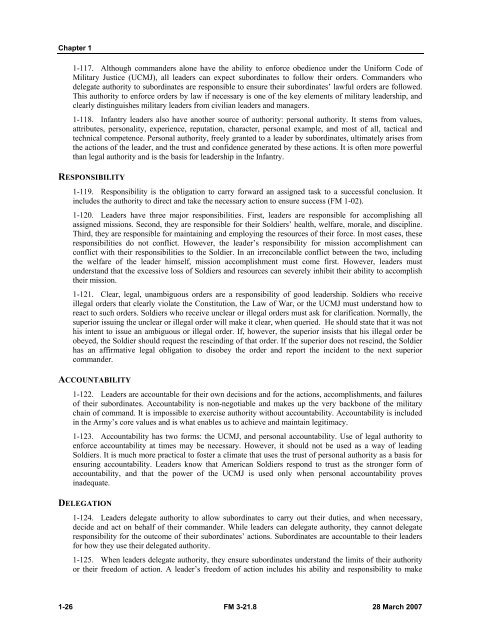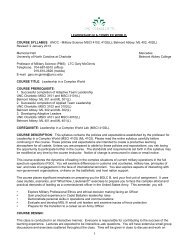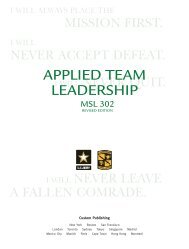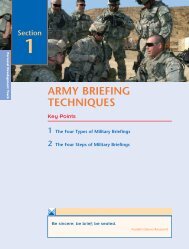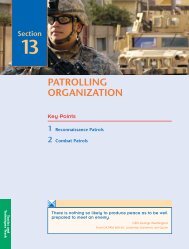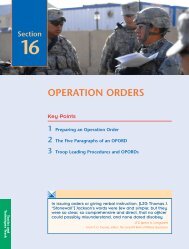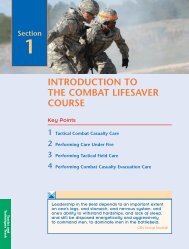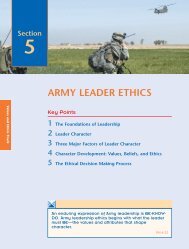Infantry Rifle Platoon and Squad - Sakai
Infantry Rifle Platoon and Squad - Sakai
Infantry Rifle Platoon and Squad - Sakai
Create successful ePaper yourself
Turn your PDF publications into a flip-book with our unique Google optimized e-Paper software.
Chapter 1<br />
1-117. Although comm<strong>and</strong>ers alone have the ability to enforce obedience under the Uniform Code of<br />
Military Justice (UCMJ), all leaders can expect subordinates to follow their orders. Comm<strong>and</strong>ers who<br />
delegate authority to subordinates are responsible to ensure their subordinates’ lawful orders are followed.<br />
This authority to enforce orders by law if necessary is one of the key elements of military leadership, <strong>and</strong><br />
clearly distinguishes military leaders from civilian leaders <strong>and</strong> managers.<br />
1-118. <strong>Infantry</strong> leaders also have another source of authority: personal authority. It stems from values,<br />
attributes, personality, experience, reputation, character, personal example, <strong>and</strong> most of all, tactical <strong>and</strong><br />
technical competence. Personal authority, freely granted to a leader by subordinates, ultimately arises from<br />
the actions of the leader, <strong>and</strong> the trust <strong>and</strong> confidence generated by these actions. It is often more powerful<br />
than legal authority <strong>and</strong> is the basis for leadership in the <strong>Infantry</strong>.<br />
RESPONSIBILITY<br />
1-119. Responsibility is the obligation to carry forward an assigned task to a successful conclusion. It<br />
includes the authority to direct <strong>and</strong> take the necessary action to ensure success (FM 1-02).<br />
1-120. Leaders have three major responsibilities. First, leaders are responsible for accomplishing all<br />
assigned missions. Second, they are responsible for their Soldiers’ health, welfare, morale, <strong>and</strong> discipline.<br />
Third, they are responsible for maintaining <strong>and</strong> employing the resources of their force. In most cases, these<br />
responsibilities do not conflict. However, the leader’s responsibility for mission accomplishment can<br />
conflict with their responsibilities to the Soldier. In an irreconcilable conflict between the two, including<br />
the welfare of the leader himself, mission accomplishment must come first. However, leaders must<br />
underst<strong>and</strong> that the excessive loss of Soldiers <strong>and</strong> resources can severely inhibit their ability to accomplish<br />
their mission.<br />
1-121. Clear, legal, unambiguous orders are a responsibility of good leadership. Soldiers who receive<br />
illegal orders that clearly violate the Constitution, the Law of War, or the UCMJ must underst<strong>and</strong> how to<br />
react to such orders. Soldiers who receive unclear or illegal orders must ask for clarification. Normally, the<br />
superior issuing the unclear or illegal order will make it clear, when queried. He should state that it was not<br />
his intent to issue an ambiguous or illegal order. If, however, the superior insists that his illegal order be<br />
obeyed, the Soldier should request the rescinding of that order. If the superior does not rescind, the Soldier<br />
has an affirmative legal obligation to disobey the order <strong>and</strong> report the incident to the next superior<br />
comm<strong>and</strong>er.<br />
ACCOUNTABILITY<br />
1-122. Leaders are accountable for their own decisions <strong>and</strong> for the actions, accomplishments, <strong>and</strong> failures<br />
of their subordinates. Accountability is non-negotiable <strong>and</strong> makes up the very backbone of the military<br />
chain of comm<strong>and</strong>. It is impossible to exercise authority without accountability. Accountability is included<br />
in the Army’s core values <strong>and</strong> is what enables us to achieve <strong>and</strong> maintain legitimacy.<br />
1-123. Accountability has two forms: the UCMJ, <strong>and</strong> personal accountability. Use of legal authority to<br />
enforce accountability at times may be necessary. However, it should not be used as a way of leading<br />
Soldiers. It is much more practical to foster a climate that uses the trust of personal authority as a basis for<br />
ensuring accountability. Leaders know that American Soldiers respond to trust as the stronger form of<br />
accountability, <strong>and</strong> that the power of the UCMJ is used only when personal accountability proves<br />
inadequate.<br />
DELEGATION<br />
1-124. Leaders delegate authority to allow subordinates to carry out their duties, <strong>and</strong> when necessary,<br />
decide <strong>and</strong> act on behalf of their comm<strong>and</strong>er. While leaders can delegate authority, they cannot delegate<br />
responsibility for the outcome of their subordinates’ actions. Subordinates are accountable to their leaders<br />
for how they use their delegated authority.<br />
1-125. When leaders delegate authority, they ensure subordinates underst<strong>and</strong> the limits of their authority<br />
or their freedom of action. A leader’s freedom of action includes his ability <strong>and</strong> responsibility to make<br />
1-26 FM 3-21.8 28 March 2007


